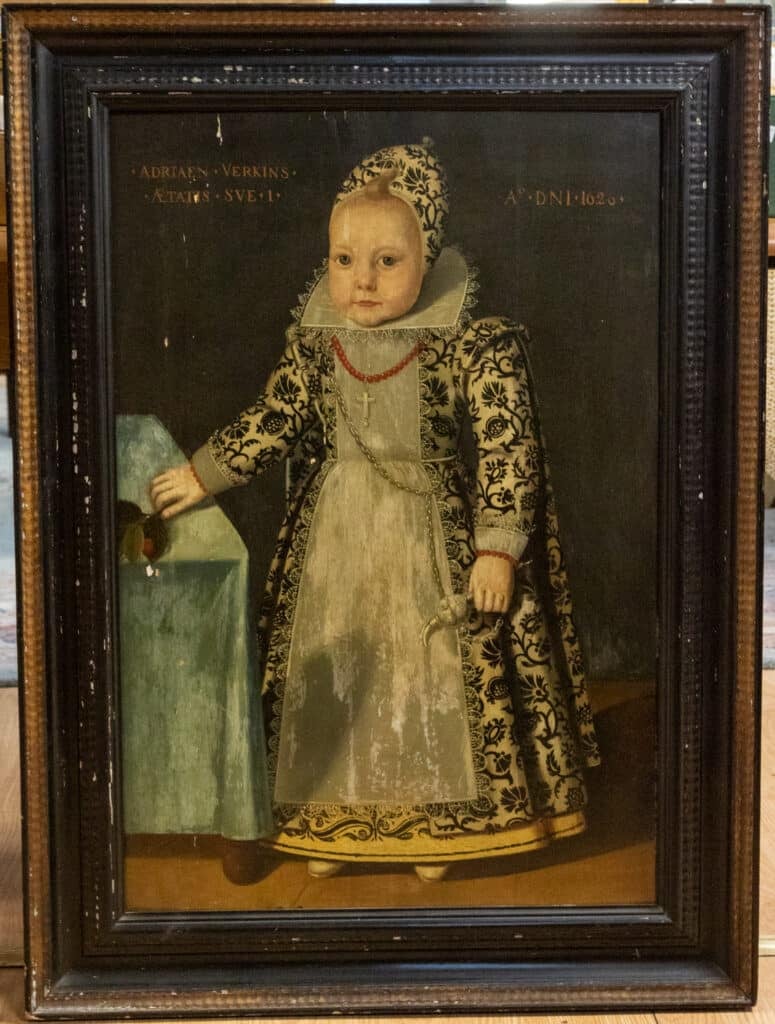
For years, a 17th-century portrait of a child hid on the back of a door in an English cottage that was crammed with antiques, rarely seen even by the eccentric collector who lived there.
Now, following the owner’s death, the artwork is set to hit the auction block in London, where it’s estimated to fetch £18,000 to £20,000 ($21,500 to $24,000).
That’s a lot for an artwork relegated to the back of a door. But if you’re wondering why such a valuable piece of art didn’t garner a more prominent placement in the Surrey home, well the painting itself may hold the answer: It’s creepy as hell.
Hansons, the auction house set to sell the piece on January 28, calls the portrait’s subject a “miniature adult.” But the phrase “weirdly big baby” may better capture this picture’s particular brand of uncanniness.
Painted nearly 400 years ago, it depicts a cherubic toddler decked out in an ankle-length gown and a lace collar. Stiffly upright the child stands next to a table, the proportions of which make her seem at least four-and-a-half feet tall.
“I was surprised to find such a compelling portrait hidden away,” said Hansons associate director Chris Kirkham in a statement. “However, I discovered there was a reason for it. The keen collector who acquired it had downsized some years before and brought all of his much-loved antiques with him.”
“His collection included several paintings which were hung on much smaller walls than they had originally been intended for,” Kirkham went on. “He struggled for display space and this little girl in all her finery got tucked away behind a door. Sadly, the collector passed away and this centuries-old work was forgotten.”
It was only by chance that the auction house executive happened to look on the other side of the door, which otherwise remained perpetually propped open. “I just happened to move it and thank goodness I did,” he said.
Courtesy of Hansons Auctioneers.
The piece is being consigned by the collector’s daughter, who called her father “an eccentric and a collector of all types of antiques and curios.”
“He had a really good eye for unusual objects and art,” she said. “It offered him a hobby away from his working life as a farmer.”
She noted that she thinks the man “may have purchased the painting at auction many years ago but can’t be sure.”
In the upper register of the canvas is the artist’s name, Adriaen Verkins, and the date it was created, 1626. Hansons suggests that Verkins may have been a Dutch artist whose work—heavily influenced by that of masters like Van Dyck and Rubens—was otherwise lost to time.
The painting will be offered in the company’s Fine Art and Antiques Auction on January 28.
“It is remarkable what we find hidden away in homes, often forgotten and, in this case, behind a door,” added the auction house’s owner, Charles Hanson. “Collectors tend to fill their homes with so many wonderful items over the course of decades, it is easy to lose sight of which ones may be of special significance.”
“When you look into this little girl’s eyes you are swept back to the early 17th century. Fashions of the time for the rich—the poor were in rags—were showy and laden with ornamentation. Jewelry, lace, and multiple contrasting fabrics displayed wealth. This portrait is a remarkable find. It is like a time capsule offering an insight into the life of a wealthy child.”